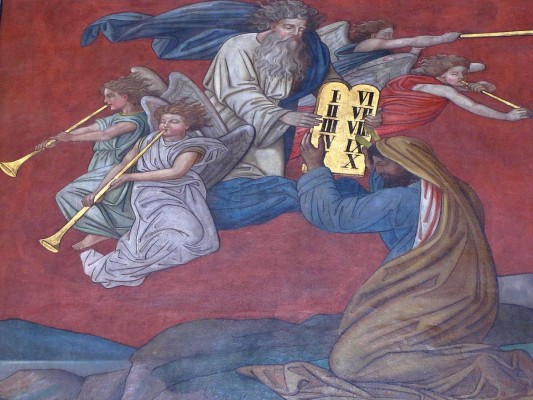Editor's note: We warmly welcome Virginia Lieto as a guest author today. Virginia is a theology professor and public speaker about the Catholic faith; she also writes children's books about virtues. - Barb
A fairly recent NY Times article on moral truths really struck a nerve with me. “Why Our Children Don’t Think There Are Moral Facts,” by Justin P. McBrayer, informs us that students are no longer taught that moral truths/values are facts. Being a student of Saints Thomas Aquinas, Francis de Sales and Bernard of Clairvaux, I really took this message to heart. Many students now view moral truths as opinions. Regarding morality, our children are being taught that what may be “wrong” for one person might not be “wrong” for another (relativism). To demonstrate further, let me share with you one of the best questions asked of students mentioned in Mr. McBrayer’s article. Is the following statement a fact or an opinion?
Cheating on a test is wrong.
Well, what do you say? Is this statement a fact or an opinion? I discussed this topic at one of my recent speaking engagements (a day retreat on the virtues with some Catholic college students). Amazingly, about 50% of the attendees thought the statement was factual and the other 50% thought the statement was an opinion. I took a deep sigh, and proceeded onward, using logic.
- Do we have a commandment that says “Thou shalt not steal?” Heads nodded yes.
- Do we have a commandment that says “Thou shalt not bear false witness (lie)?” Again, heads nodded yes.
- If cheating is defined as “stealing” your neighbor’s test answers and then “falsely stating” that they are your own test answers, then have you not broken two of God’s Ten Commandments? Heads nodded yes.
- When you break a Commandment are you committing a sin? Heads nodded yes.
- Let me ask you again, is the following statement a fact or an opinion: Cheating on a test is wrong. Now the answer was 100% “Fact!”
By using critical thinking, and walking the attendees down the path of understanding moral truth, they were then able to connect the dots that moral truths are representative of Truth itself and that Truth itself is non-contradictory; therefore, factual.
Moral truths get clouded amongst the pervasiveness of secularism, individualism and relativism. These “isms” erode our collective moral conscience, not to mention dulling our individual consciences. Secularism takes God out of the collective discussion. Individualism puts the individual first, over God and the collective community. Relativism gives everyone license to head down that slippery slope to perdition.
The onus of responsibility for teaching virtuous behavior lies solely on the shoulders of parents. As adults, we are the living example of virtue for our children. Moral values and virtue seem to be passé, yet they are so desperately needed in our society today. It is incumbent upon us, as adults, to guide our children toward the Supreme Good, Our God. The path to that closer relationship with God starts by embracing virtue. He calls us to holiness!
Our children mimic us. What we demonstrate about our own behavior becomes their behavior. Reflect on this question: What area of your own life could use some spiritual boosting when it comes to virtue? Then evaluate your children, with all honesty, and ask what path they are headed down regarding this same needed virtue. At the dinner table this evening perform your own little test using the information noted in the linked article above. See what kind of answers you get. Only then will you know how much work lies ahead in building virtue in your children.
Copyright 2015 Virginia Lieto
Art: "Mackenheim StEtienne18" by Rh-67 - Own work. Licensed under Public Domain via Wikimedia Commons.
Work Cited:
McBrayer, Justin P. “Why Our Children Don’t Think There Are Moral Facts.” New York Times 2 Mar 2015, Web. 2 Mar 2015.
Virginia is an adjunct professor at Saint Joseph’s College of Maine – Theology Program Online, where she also obtained her Master of Arts Degree in Pastoral Theology. You can find her blogging about the virtues at virginialieto.com. Virginia’s upcoming children’s book titled Adventures of Faith, Hope and Charity – Finding Patience will be published in 2015. Virginia speaks publicly on the Catholic faith. She lives in Harrisburg, NC, with her husband Nick.
About the Author

Guest
We welcome guest contributors who graciously volunteer their writing for our readers. Please support our guest writers by visiting their sites, purchasing their work, and leaving comments to thank them for sharing their gifts here on CatholicMom.com. To inquire about serving as a guest contributor, contact editor@CatholicMom.com.




.png?width=1806&height=731&name=CatholicMom_hcfm_logo1_pos_871c_2728c%20(002).png)
Comments